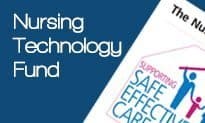Further details about the second round of NHS England's Nursing Technology Fund, including an expansion of eligible organisations, are set to be released shortly.
Caroline Alexander, NHS England's regional chief nurse for London, told the Healthcare Efficiency Through Technology conference that the organisation is “at the final stages of decision-making” for the second round of the fund, with an announcement expected soon.
NHS England received more than 220 applications from 140 trusts for the first round of the fund, with 85 projects from 75 trusts chosen to receive a share of the £30m on offer.
Alexander said NHS England is aware of frustrations from care providers about the limitations of the first round, which was open only to trusts and foundation trusts.
She said she “anticipates” that the second round will be open to any providers of NHS-funded nursing care, including social enterprises and local authorities.
“In the future, when care is delivered in a range of different settings, there needs to be that backing there for everyone.”
Alexander said the second round of the fund will also allow applications for a wider range of projects than the first round, which focussed on mobile working, digital pens and bedside monitoring.
“The first round was very quick, but we had to get it up and running quickly to help make changes in the most systematic way possible.”
She added that she hoped the second round will encourage collaboration between the nursing profession and healthcare IT professionals.
“It's not about the technology people; it's about the nursing and the technology people working together to get things right.
“We don't want people to fail in this, so we need innovators who will help the nursing profession to take technology seriously.”
Alexander said applicants will also need to show that they can implement the technology they request in such a way that it is put to the best use possible. She said they will have to show there is a strong clinical benefit underpinning it.
“We need to make sure they've thought through how to implement stuff – you see cases where they've bought a lot of new kit but it never gets delivered, because they don't have the structures in place.
“People are still thinking about it as bits of kit; they're not embedding it in temporal thinking about what we can do.”
Despite this, Alexander said community health is one area set to undergo a technology transformation.
“We've got a great opportunity: we're at the heart of a time where the community revolution is about to start, and it's time to get some really innovative community technology out there.”

